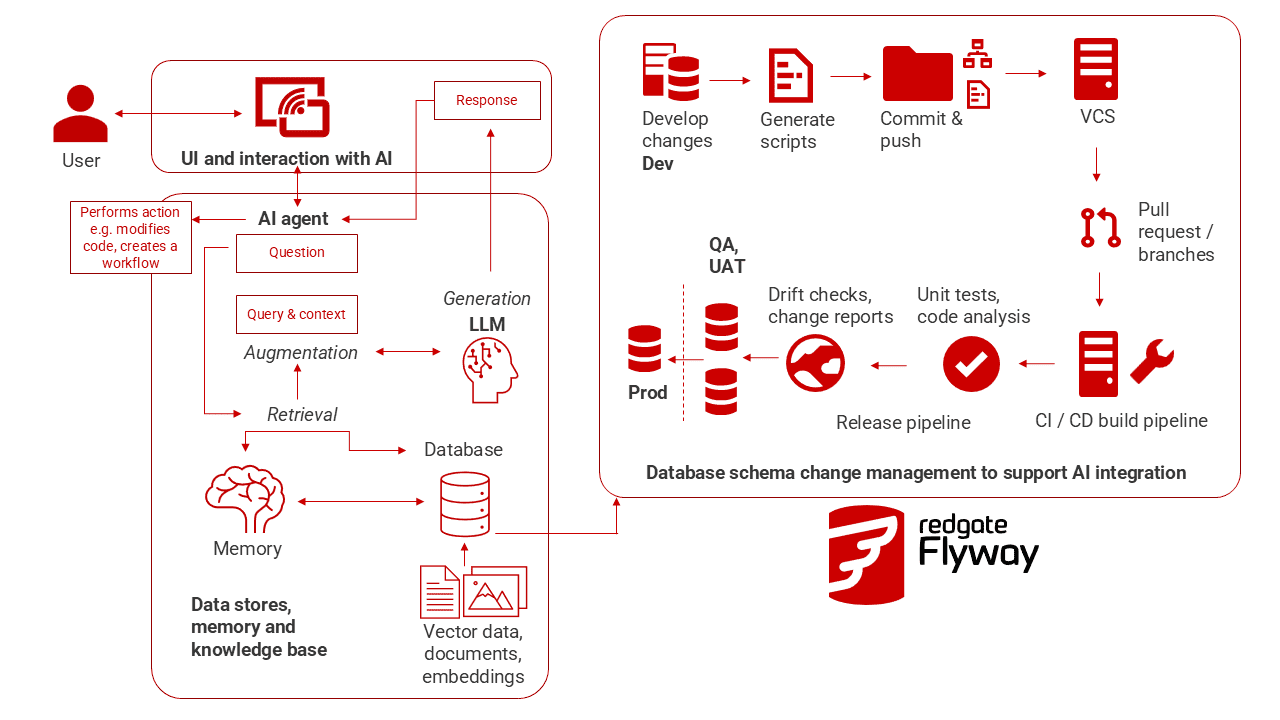Making AI scalable with database change management and Redgate Flyway
With the rise of AI and machine learning comes data. Lots of it. For organizations today, AI is radically changing the way data is accessed, maintained and operationalized.
For heads of architecture and development teams, it offers opportunity and responsibility.
Opportunity to:
- Accelerate development team productivity
- AI can be a collaborative force to speed up mundane tasks, such as technical documentation or repetitive coding
- Completes IT
- AI can enhance, extend and automate IT jobs to drive more efficiency and free up time against a backdrop of demands to do more with less
Responsibility to:
Ensure that data architecture is set up for:
- Scalability – managing the compute and storage demands of AI workloads
- Data readiness – ensuring data pipelines are robust and scalable
- Security and compliance – meeting evolving regulations with auditable systems and processes
- Cost management – weighing up innovation and speed with sustainable investments
Done right, it will lend organizations more resilience and competitive advantage over the longer term.
“In the evolving landscape of AI, the future hinges on our ability to not just experiment, but to strategically pivot – transforming experimentation into sustainable innovation. As we embrace AI, we need to prioritize relevance, urgency, and resourcefulness to forge resilient enterprises that thrive in a data-driven world.”
Rick Villars, Group Vice President, Worldwide Research at IDC
Why IT leaders should prioritize database change management for AI
As AI becomes central to business innovation, data readiness is critical. That means ensuring data is accurate, accessible, secure, and structured to support AI workloads. But readiness isn’t just about the data – it’s also about the infrastructure that stores and evolves it.
AI systems are sensitive to schema changes. Unstable or inconsistent database structures can derail model training, corrupt insights, or introduce costly downtime. That’s why database modernization – and specifically, robust change management – is essential.
A strong database change management strategy enables:
- Stable, version-controlled schema evolution to support AI pipelines.
- Faster iteration on data models through CI/CD integration with database schema changes.
- Compliance support via traceable, auditable database change histories.
- Optimized data structures for better AI performance and insight extraction.
- Adaptability for vector data and other AI-specific formats.
For IT leaders, this means designing systems that treat database changes with the same rigor as application code – versioned, tested, and deployed automatically. It’s foundational to scaling AI safely and sustainably.
How Redgate Flyway supports scalable, sustainable AI
As AI pipelines become more data-intensive and schema-sensitive, database change management must be automated, reliable, and scalable. Redgate Flyway Enterprise delivers this:
- CI/CD integration for stability
- Automated testing in CI/CD pipelines catches breaking changes early, keeping AI data pipelines stable and reducing risk of data loss or downtime.
- Supports vector data evolution
- Prepares schemas for AI-native data types like vectors, enabling smooth integration of embeddings and semantic search capabilities.
- Version-controlled schema evolution
- Schema changes are tracked in version control, enabling AI models to reliably interpret evolving data structures.
- Cross-platform standardization
- Supports 50+ DBMS with consistent workflows across SQL Server, PostgreSQL, Oracle, MySQL, and more—reducing errors and manual overhead.
- Flexible deployment models
- Supports both state- and migrations-based approaches, integrating with GitHub, Azure DevOps, Jenkins, and other CI tools for easy adoption.
- Compliance and auditability
- Maintains a full audit trail of database schema changes down to the object level – critical for regulated environments and fast troubleshooting when AI models fail.
- Reduces technical debt
- Automates script generation, testing, and deployment – freeing teams from legacy processes and enabling scalable AI innovation.
AI workflow, enhanced by database change management to support AI needs
The workflow diagram below illustrates how robust database change management underpins successful AI integration within modern data infrastructure. AI applications often introduce rapidly evolving data requirements – such as support for vector embeddings, feature stores, or other specialized structures – which demand agile and reliable schema evolution.
Redgate Flyway Enterprise enables developers to automatically generate deployment scripts that precisely reflect required schema changes for SQL Server, PostgreSQL, Oracle and MySQL databases. These scripts are version-controlled, ensuring a single source of truth and full traceability.
By integrating Flyway Enterprise into CI/CD pipelines, teams can validate and test database changes early in the development lifecycle, significantly reducing the risk of production downtime or instability. This approach ensures that data platforms remain adaptable and resilient, even as AI-driven demands accelerate.
Integrating database change management with AI-ready data infrastructure empowers teams to innovate with confidence and control. This approach goes beyond simply accelerating the deployment of schema changes to meet AI’s evolving data demands. It establishes a robust framework where experimentation is safe, repeatable, and governed.
With Redgate Flyway embedded into CI/CD pipelines – just like application code – teams gain automated safeguards that catch issues early, before they reach production. This alignment ensures that data platform evolution keeps pace with AI innovation, without compromising stability or increasing risk. It’s about striking the right balance: enabling rapid iteration while maintaining the integrity and reliability that enterprise systems demand.
“Despite the risks, the potential benefits of AI are huge. Companies that don’t explore and use AI tools risk falling behind. The key is finding the right balance between making the most of AI’s capabilities and managing its risks.”
Jeff Foster, Director of Technology & Innovation, Redgate
Find out more
Read our latest case studies to see how Redgate Flyway is bringing speed and stability to database change management for organizations worldwide.
